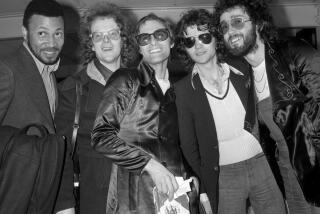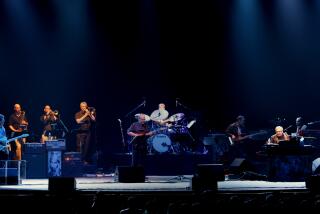James Moody dies at 85; jazz saxophonist and flutist
James Moody, a jazz saxophonist and flutist whose improvised solo on a recording of the song “I’m in the Mood for Love” became a jazz classic, died Thursday in San Diego, where he had lived in recent years. He was 85 and had pancreatic cancer.
His death was confirmed by a spokeswoman for the San Diego Hospice.
The recording, made in Stockholm in 1949, became a rare jazz hit as an instrumental. When singer King Pleasure recorded Eddie Jefferson’s lyrics for Moody’s improvisation in 1954, it became a cross-genre hit, subsequently recorded by singers ranging from Van Morrison, George Benson and Aretha Franklin to Tito Puente and Amy Winehouse. Moody, himself, frequently sang the version with lyrics in his live performances.
FOR THE RECORD:
An earlier online version of this article said singer King Pleasure wrote and recorded lyrics for James Moody’s improvisation of “I’m in the Mood for Love” and that the recording was made in 1952. Eddie Jefferson wrote the lyrics and Pleasure recorded them in 1954.
The original improvisation was recorded on alto saxophone, an instrument Moody had not been playing at the time.
“Up to this point, I had been playing strictly tenor saxophone,” he told Times jazz writer Leonard Feather in 1988. “At one session, I noticed that Lars Gullin, the Swedish saxophonist, had an alto sax lying around. I said, ‘Do you mind if I try it out?’ ”
Moody did not initially expect to record with the alto, however, and the song came to life only as a spontaneous, last-minute addition to the session.
“The producer decided we needed an extra tune,” he recalled. “But [he] didn’t have any music prepared. I suggested making ‘I’m in the Mood for Love,’ and we went ahead and did it, in one take, with me playing this beat-up alto saxophone. Well, you know what happened.”
Universally called by his last name by friends and fans alike, Moody was warm and amiable, invariably greeting acquaintances with a hug and a kiss on the cheek. The same qualities were present in his instrumental playing, as well, which matured in sync with the arrival of bebop in the mid-’40s. Quickly grasping the complexities of the new style, with its extended harmonies and shifting rhythms, Moody added an appealing melodic flow to his improvised solos, expressed in instrumental timbres approaching the qualities of the human voice.
“Over the years, Moody has become so free — not in a random fashion, but a scientific freedom — that he can do anything he wants with the saxophone,” Moody’s contemporary, saxophonist Jimmy Heath, told Down Beat magazine’s Ted Panken. “He has true knowledge. He is in complete control.”
Feather, reviewing a Moody performance for The Times in 1972, agreed. “Moody brings to his tenor saxophone an immense sound,” he wrote. “Relying on the natural tone quality....he offers hard-hitting, stimulating jazz, rooted in the idiom fathered by [ Charlie] Parker and [ Dizzy] Gillespie.”
Like his lifelong friend and mentor, trumpeter Gillespie, Moody was able to find a convincing balance between entertainment and art — a balance that eluded many of his contemporaries. In any given set, he would frequently juxtapose long, inventive improvisations against his witty vocal renderings of “Moody’s Mood For Love,” then switch to a humorous paraphrase of “Pennies From Heaven” titled “Benny’s From Heaven,” topped off with another briskly exploratory solo.
Moody’s easygoing manner, wry humor and musical versatility served him well in a career in which he moved deftly from alto and tenor saxophones to clarinet and flute. His rich resume included — in addition to his continuing jazz performances with small groups and big bands — stints in which he backed the likes of Elvis Presley, Redd Foxx, Liberace and the Osmonds.
In 2005, he added an unusual sidebar to his busy career when he made a cameo appearance in the Clint Eastwood-directed film, “Midnight in the Garden of Good and Evil,” as a porter in a law office who walks an imaginary dog. Moody frequently joked about the fact that he only had one line to say: “Yessir. Patrick do like his morning walk.”
The affection with which Moody was viewed by musicians, celebrities and fans was on full display in several musical parties celebrating his milestone birthdays. His 75th anniversary, which took place at New York City’s Blue Note jazz club, was released as a live recording titled “Moody’s Birthday.”
“I think you’re looking at a man who knows love and knows how to accept it and give it without hiding, without treating it as if it was some sort of weakness,” Bill Cosby, who hosted Moody’s 80th birthday celebration concert at Walt Disney Concert Hall, said in an interview with the Copley News Service. Moody “has taught me integrity, how to express love for your fellow human beings, and how to combine and contain manhood and maturity.”
James Moody was born March 26, 1925, in Savannah, Ga., and was raised in Reading, Pa., and Newark, N.J. His father was a trumpeter, his mother a dedicated jazz fan.
“My mother loved jazz,” he told Calvin Wilson in the St. Louis Post Dispatch. “She had records by Chick Webb, Ella Fitzgerald, Count Basie and Jimmy Lunceford, and I heard those records playing at home. I’m thankful for that, because she could’ve been a doo-wop person, and that would have been a drag.”
Moody was born with a hearing defect in his left ear. Initially undiagnosed, it made it difficult for him to hear questions in class. Because of his poor grades, he was sent to a school for retarded children. The malady was properly treated when he entered high school in Newark, where his grades improved and he began to play the alto saxophone, a gift from an uncle.
After serving in the Army Air Forces from 1943 to ‘46, Moody joined Gillespie’s band and made his own first recording, “James Moody and His Bebop Men.” He moved to Europe in the late ‘40s, remaining there until 1951, performing with Miles Davis and others, and recording “I’m in the Mood for Love.”
Settling in New York City in the early ‘50s, he led various ensembles — including a septet that played jazz-influenced rhythm & blues — made a series of recordings for Argo, and worked with Gillespie, an association that would continue intermittently until Gillespie’s death in 1993. A brief period working with Las Vegas show bands in the ‘70s was followed by a return to jazz and the leadership of his numerous ensembles. In the late ‘80s, he was a founding member of Dizzy Gillespie’s United Nation Orchestra.
Moody, a multiple Grammy nominee, was chosen an NEA Jazz Master in 1998.
Survivors include his wife of 21 years, Linda; a brother, Lou Watters; a daughter, Michelle Bagdanove; sons Patrick, Regan and Danny McGowan; four grandchildren and one great grandson.
More to Read
Start your day right
Sign up for Essential California for the L.A. Times biggest news, features and recommendations in your inbox six days a week.
You may occasionally receive promotional content from the Los Angeles Times.






